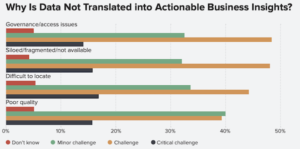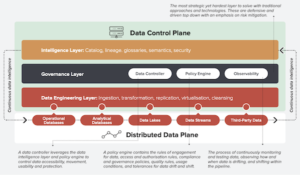
Immuta Report Highlights ‘Aspiration Gap’ in Cloud Data Management

A new IDC InfoBrief, sponsored by data access specialist Immuta, has found that while 87% of European CXOs named becoming a data-driven organization as a high priority, significant challenges remain in their cloud data management strategies. Despite a desire to become data-driven through cloud adoption, only 30% reported widespread data use in their organization’s decision making processes, leaving what IDC calls an “aspiration gap.”
This gap is taking its toll as organizations work towards cloud data management goals, and the survey uncovered several underlying causes. As the top issue cited by survey respondents, data access and data governance difficulties are a roadblock for businesses looking to transform their data into useful business insights. Nearly 95% responded that these difficulties are either a “Minor Challenge,” “Challenge,” or “Major Challenge,” and 62% saw a lack of proper data access governance as a limiting factor in achieving business objectives.
According to Immuta, respondents ranked both access and governance in the “Most Challenging Cloud Data Management Areas” as well, with 28% emphasizing identity and access management and 23% finding trouble with governance. The company says this is by far the most prevalent issue, and therefore the biggest bottleneck to optimizing cloud data management.
“Cloud migration, especially when companies have adopted multiple cloud data platforms, has created significant problems for businesses, in particular the ‘time to data delay’ where organizations struggle to efficiently manage data access demands while balancing privacy and security requirements,” explains Immuta’s EMEA General Manager, Colin Mitchell.

The report uncovered the reasons why organizations feel they are not fully utilizing their data. Source: Immuta/IDC
Improper cloud data management leaves more at stake than missing the mark on business objectives, according to Immuta’s Peter Keough. “Issues with controlling data access can have a detrimental effect on security and privacy, giving bad actors a better chance at accessing sensitive information. They can also lead to legal troubles, as data that isn’t governed effectively likely isn’t compliant with data privacy regulations like GDPR. Organizations can collect and store petabytes of data, but it won’t be an asset to the business if it can’t be accessed efficiently while being monitored for secure governance and compliance,” he said in a blog post.
Another problem businesses are facing is siloed and fragmented data resources. Data silos are isolated from the common repository and are sometimes limited to single departments where there is no interaction with the rest of the data stack. Or data is fragmented across too many locations, hindering data sharing and collaboration. There are also data quality issues to worry about with siloed data. The survey asked respondents which capabilities they felt were essential for data use and resilience in the cloud, and 28% answered data integrity and quality while 24% named data mobility.
The third challenge felt most often is poor data visibility, as inadequate infrastructure can make data difficult to locate and utilize. For 46% of those surveyed, visibility issues caused them to report a lack of enough data and information available to make decisions in a timely manner. In fact, the report mentions how IDC research shows that only 32% of data available to enterprises is actually used, with the remaining 68% going unleveraged.

This graphic explains how a governance layer in a data control plane can assist with cloud data management.
IDC concludes its InfoBrief with the recommendation that organizations adopt DataOps solutions, such as Immuta’s data control plane with embedded governance and security features, including attribute-based access controls and automated audit logs. Also, an access policy engine can give users a unified set of rules for data use, including access and authorization rules, compliance and governance policies, quality rules, and usage conditions.
“Organizations need to automate data access at scale and the technology to do that is attribute-based access control, or ABAC,” said Mitchell. “The move from legacy role-based access control (RBAC) to ABAC simplifies data access control and provides dynamic policy enforcement. It enables organizations to move from a default ‘no’ to a default ‘yes,’ enabling more teams to gain value from their data.”
To read the full report, visit this link.
Related Items:
Immuta Raises $100M Series E as the Latest Data Access Unicorn
Finding the Data Access Governance Sweet Spot
How Unified Data Access Governance Will Determine the Winners and Losers in the New Data Economy






























